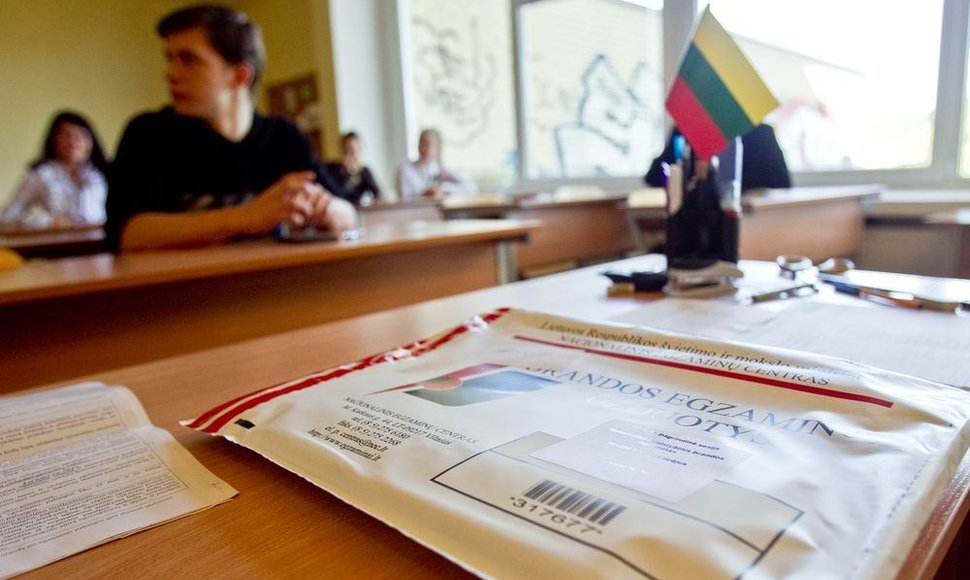12-form students await with unease the final examination that will conclude their secondary education next spring. 2013 will be the first year that all graduating students in Lithuania will have to take the same exam in the Lithuanian language and literature.
“To my mind, it is impossible to get a good mark for this exam,” Irena Volska, headmistress of Polish-language Šalčininkai Jan Sniadecki Gymnasium, says sadly. Her school is attended by 695 pupils, 53 of whom will be graduating next year.
It is the latter that Volska is most concerned about. They will be the first class of Polish-speaking graduates to take the much-debated unified exam in the Lithuanian language and literature.
Lithuanian exam is compulsory to all students graduating from schools in Lithuania. However, until recently, there were two versions of the exam. One was designed for native speakers and the other – called State Language Exam – was intended for disciples of the country's national minority schools. But several years ago, parliament passed amendments to the Law on Education, unifying the Lithuanian exam for all graduates.
“We have already been instructing according to the new curriculum last year, but our Lithuanian teacher said she was several months short to present all the material. After all, it is not enough just to read the book, you must work on it, analyse it, understand it. So she will have to finish last year's course this year and squeeze in the entire 12-form programme, too,” the headmistress says.
Unfulfilled parental expectations
Volska still thinks it is inconceivable why the government set out to implement the change so fast, with only two-year transitional period.
“We are not against the reform as such. We just want enough time to adapt and better prepare for it. After all, parents had a right to know what to expect when they made the decision to have their kids attend a Polish school. They had certain expectations and certainly had no idea that the rules would be changed in the middle of the game,” Volska says.
She notes that this year's graduates are not playing on a level field – some of them have been studying Lithuanian as a native language since the 5th form, with at least 5 weekly hours of classes, while others only as a state language with only several weekly hours. Literature curricula in Lithuanian and Polish schools were entirely different until the 11th year.
“Textbooks, programmes were completely distinct. I cannot understand why the sudden concern about pupils of Polish schools not speaking good Lithuanian. Where were the authorities looking for the last twenty years? It wasn't us [Poles] who divided up the curriculum into two versions, the native language and the state language. We taught our pupils Polish literature and now we are given two years to cover the same material that Lithuanian schools spend eight years studying – it is simply too much,” Volska says.
Doubts about marking
Nor is she appeased by special marking concessions for non-native speakers, who will be allowed more mistakes than students of Lithuanian schools.
“If we are given concessions, different marking criteria, kids from Lithuanian schools will resent it. What unified exam are we talking about, if marking criteria are different? That means that the two groups will not have equal opportunities. Different conditions – unfair competition,” the headmistress is convinced.
She thinks that the fair thing to do would be to introduce the new curriculum to current first-formers or fifth-formers and have the unified exam when time comes for them to graduate.
She still awaits results of mock-exams taken by eleven-formers last April. “We don't know how we did, Lithuanian teachers do not know how to proceed, which parts still need work. Besides, if we do get the mock-exam results in time, will they be objective?”
Summer rust
Polish-speaking pupils make up the absolute majority of students at Jašiūnai Aušra Secondary School in Šalčininkai District, yet the school uses Lithuanian curriculum.
Nevertheless, students and teachers here are no less anxious about the unified Lithuanian exam.
“Our district is very peculiar. Pupils live in a multilingual environment. Half a day, while at school, they speak Lithuanian, but back home, in the streets, among their peers, or in a shop they use their native tongue, Polish. Therefore, after each summer break, kids find it hard to switch back to Lithuanian, as they do not use it for three months,” says deputy headmistress of Aušra Secondary School Dalia Paltanavičienė.
The school is attended by 212 students. 14 of them will be graduating next spring. “It is difficult for them to analyse Lithuanian literary works, I therefore think we are not ready to perform equally well at the exam. Especially since non-native speakers often need additional clarification, if tasks contain specific words, even during science olympics. So I'm not sure if, under such circumstances, it is possible to reason and argue in Lithuanian – as the exam requires,” she speculates.
She recalls, however, that one graduate of Aušra Secondary School applied to study Lithuanian at a university several years ago, even though her parents did not speak any Lithuanian.
“Kids are doing their best, as they know that they won't achieve anything otherwise. Some of them choose to watch Lithuanian TV shows, read Lithuanian books. But not everyone is good at languages. I would hate to see pupils who haven't mastered the Lithuanian language so well being marginalized – failing the exam, not entering a university, emigrating,” Paltanavičienė says.
Same textbooks
Education Vice-Minister Vaidas Bacys notes that the Lithuanian language and literature curriculum, approved by the ministry in July last year, was new to all schools in Lithuania, not just those of national minorities.
“It's an absolutely new curriculum for all schools in the country, since for the first time in the twenty years of independence, we embrace the multi-cultural Lithuania of the Grand Duchy times, we try to reveal the Lithuanian heritage in the national context, to include authors and poets who lived in the territory of Lithuania but wrote in other languages. It is a huge break for Lithuanian schools,” Vice-Minister notes.
He adds that both Lithuanian and national minority schools use the same textbooks to teach the Lithuanian language and literature, so everyone has equal opportunities to learn things in the new programme in two years.
The deciding essay
All school graduates in Lithuania will be taking one exam in the Lithuanian language and literature. They will be given 4 hours to produce a 500 to 600-word essay (for a state-level exam; for a school-level exam, it is 350-400 words).
During the exam, students will be allowed to use Lithuanian or bilingual dictionaries.
Nida Poderienė, chief specialist at the Basic and Secondary Education Department of the Ministry of Science and Education, says that the exam is designed so as to allow students to show off their strengths and not to detect and penalize gaps in their knowledge.
“Students will be able to pick one question out of four and answer it drawing on one author out of three. There are no reading comprehension or language use tasks – the essay will show how the student has mastered the language. The main criteria for marking will be the content: clear presentation of ideas, consistent argument, position on one or another issue. In the essay, students will have to show their maturity, cultural literacy, ability to reason and draw conclusions. If they have doubts over how to spell some words, they will be able to look it up in a dictionary,” Poderienė says.
“During the mock exam, students were offered to elaborate on the question “What makes life worth living” drawing on literary works by Vincas Kudirka or Adam Mickiewicz. If I had to choose, I'd use Mickiewicz's Ode to Youth – a compulsory piece from the programme. The secondary school curriculum includes all Lithuanian-Polish authors, like Czeslaw Milosz, Maciej Kazimierz Sarbiewski, etc. I stick to the rule that exam questions must include at least one author who wrote in other languages than Lithuanian, so that students have more choice,” says Vice-Minister Bacys.
Protecting from isolation
During an eight-year transitional period, essay marking criteria for expression and literacy will be determined according to results of previous exams. Markers of the first exam this spring will draw on results of the mock exam. The marking criteria will be approved and announced well before the examination date, by 15 November. Until now, marking criteria used to be specified in the exam paper itself.
“We do realize that a kid who does not use Lithuanian at home might have more difficulty with spelling. That is why we specify different marking rules – pupils from national minority schools will be allowed more mistakes,” Bacys says.
The Vice-Minister promises that results of the mock examination, taken last April, will be revealed in October. “We would like to first discuss them within a working group that includes national minority representatives. We have already shared preliminary data with national minority representatives during a meeting in Klaipėda. The data show that all fears are unfounded. There are no significant variations between native and non-native speakers in the way kids grasp literature or construct arguments,” Bacys rejoices.
He points out that knowing several languages is a great asset in the present-day world: “We must help kids integrate into the society. After all, mastering the state language is a guarantee for one's future career. We feel responsible for kids, we cannot afford to have an education system that ignores or isolates part of the society.”
Numbers
During the 2011-2012 academic year, there were 55 schools in Lithuania with Polish as the language of instruction, 36 with Russian, one Belarusian. Another 42 schools were mixed.
In total, 15,552 students were instructed in Russian, 12,895 in Polish, and 181 in Belarusian.
Two schools teach minority languages as a subject and pay particular attention to ethnocultural education. These are Jewish Sholem Aleichem Secondary School in Vilnius and German Hermann Sudermann Gymnasium in Klaipėda.













